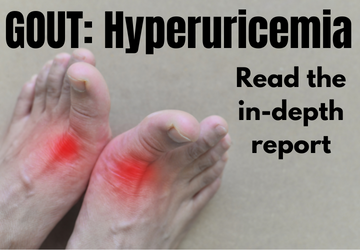Gout: Hyperuricemia
Gout is a metabolic disorder that causes a painful and common type of arthritis. It is caused when there is too much uric acid in the blood. This is called hyperuricemia. Uric acid is a breakdown product of normal metabolism in the body and is normally excreted through urine. The buildup of uric acid results in needlelike crystals forming in the joints, soft tissues, and organs.
Cases of gout have increased in recent years. This increase is likely due to an aging population, dietary and lifestyle changes, the rising incidence of obesity, greater use of medicines, such as diuretics (water pills), all of which can lead to a high uric acid level in the body.
Symptoms of Acute Gouty Arthritis
Acute gouty arthritis occurs when the first symptoms of gout appear. Sometimes the first signs of gout are brief twinges of pain (petit attacks) in an affected joint. These attacks can occur for several years before the full-blown condition occurs.
Symptoms of acute gouty arthritis often start in one joint and include any of the following:
- Severe pain at and around the joint: may feel like “crushing” or a dislocated bone; physical activity and even the weight of bed sheets may be unbearable; usually takes 8 to 12 hours to develop; occurs late at night or early in the morning and may wake you up.
- Swelling that may extend beyond the joint.
- Warmth over the joint.
- Red, shiny, tense skin over the affected area, which may peel after a few days.
- Chills and mild fever, loss of appetite, not feeling well in general.
Treatment and Management
- Some medications are aimed at treating acute attacks by reducing pain and inflammation in the joints and other tissues.
- Other medications are aimed at preventing future attacks by lowering uric acid in the body.
- These medications are generally well-tolerated and may include allopurinol, febuxostat, and probenecid.
- When medications to lower uric acid levels are first started, flare-ups of gout are more likely. Thus, it is important to take medications to prevent flare-ups during this time.
- Lifestyle changes are important in preventing attacks and managing the condition. Measures include losing weight, limiting foods and beverages with a high purine content, and limiting alcohol.

